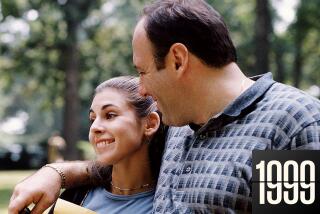This midseason, watch as TV changes before your eyes
Human beings are such gorgeously contradictory creatures — we demand variety (it’s the spice of life!) and hate change. Nowhere is that more pronounced than in our attitude toward television; we regularly decry the monotony of the standard formats and then yelp when someone messes with them.
“Rubicon” was too slow and complicated, “Men of a Certain Age” too insular and morose, “The Killing” was a rip-off (because it didn’t conclusively reveal the murderer) and “American Horror Story” is way over the top. Well, quit whining and get used to it because (a) it’s a wonderful thing and (b) the midseason shows go even further.
You think you’ve seen slow? Wait till you take a gander at HBO’s “Luck.” Hard to follow? Check out NBC’s “Awake,” due out in spring. Over the top? ABC’s upcoming “The River” revels in voodoo on the Amazon, and NBC’s “Smash” isn’t content to simply follow the making of a musical, it has to be a musical about Marilyn Monroe.
The fact is that while everyone’s been wringing their hands over TV’s ever-shifting delivery system, its rules and regulations regarding character, tone and narrative form have been morphing even faster. After turning the nature of the hero inside out with characters like Gregory House, Dexter Morgan and Patty Hewes and blurring the line between comedy and drama with shows like “Nurse Jackie” and “Parenthood,” television writers — fired up by the success of such diversely nonconformist shows as “Lost” and “Mad Men” — are pushing at the floorboards and roof beams of story.
Even those insiders who hail “Luck” as a masterpiece concede it takes five episodes to get going. Meanwhile, “Awake’s” conceit is quite simply that no one is quite sure which version of events is real. Taken together, they make Fox’s “Fringe,” in which the existence of two parallel universes has become so mundane that it now serves as backdrop, seem positively parochial.
Progress does not equal perfection, but it is fascinating to watch, even — and maybe especially — the failures. Not the shows that bomb because they’re cheesy knockoffs, but the ones that close their eyes and take the leap. They may not stick their landing, but there is beauty in those few frenzied minutes of flight.
Who thought a show about a mobile surgical unit during the Korean War, based on a darkly satiric film, would last longer than the war it portrayed? This season we’ll witness a similar experiment. Can “The Firm” transcend its literally closed-book parameters and create a TV sequel to both novel and film? Imagine the possibilities if it works! Whatever happened to Atticus Finch and those adorable children anyway? Didn’t they grow up to solve crimes or something?
We may joke and sniff about “game-changing” shows, but “Hill Street Blues” gave us the procedural-serial hybrid and “Seinfeld’s” proud announcement that it was about “nothing” punched a hole in the thematic universe. “Luck,” with its rogues gallery portraiture, and “Smash,” which chronicles the creation of Broadway musical (“Glee” meets “A Chorus Line”), may do the same thing.
In a way, shows like this can’t lose. Even if they fail in the ratings, they advance the art form, establishing which limits are real — no, thanks, but we won’t watch a show based on a commercial about cavemen — and which are simply products of fear or lack of imagination.
But people are fickle; they say they want something new and they mean they want something old, but in another color or with a longer strap. It will be interesting to see if everyone who swore they would never watch “The Killing” again adheres to their vow or if “Luck” finds an audience outside racetrack junkies.
In the long run, it doesn’t matter; the changes have begun and the networks will realize that it wasn’t the period feel of “Mad Men” or the jungle climate of “Lost” but their fearless symphonic phrasing that made them so appealing. The shows that can seem so jarring and alien today will be the next generation’s quaint classics.
More to Read
The complete guide to home viewing
Get Screen Gab for everything about the TV shows and streaming movies everyone’s talking about.
You may occasionally receive promotional content from the Los Angeles Times.







